Jennifer Crusie's Blog, page 160
March 31, 2019
Happiness Report
March 30, 2019
Cherry Saturday, March 30, 2019
Today is Pencil Day.

Yeah, I know, not exciting. Okay, March has been Umbrella Month.
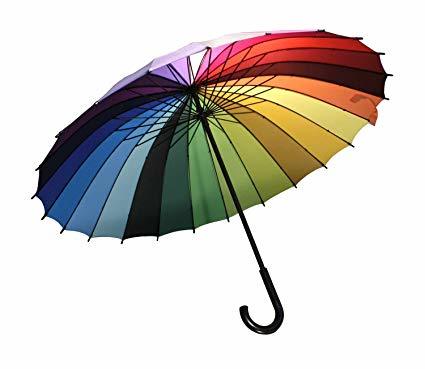
The thing is I like both pencils and umbrellas, but if I had to pick one, it would be the pencil, as long as it had an eraser. Because those suckers are awesome.

Of course, so are umbrellas.


What the hell, celebrate both.
The post Cherry Saturday, March 30, 2019 appeared first on Argh Ink.

March 29, 2019
Nita: A Progress Report
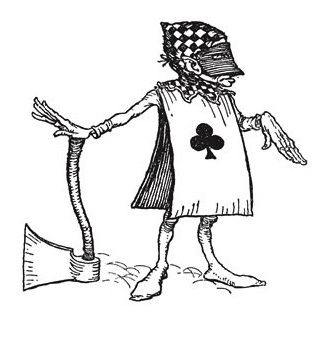
So I’m going back to the original manuscript and starting my pruning from a different perspective. I had cut a lot from the book, but it wasn’t getting better, it was just getting shorter and thinner, not as much depth, not as rich, and it felt rushed. Maybe it needed to be 135,000 words? No. I knew the book was lardy, over written, Too Much Stuff. So I reconceptualized my approach. (That’s the way we MFAs talk. Actually, I just said, “Well, this sucks, Crusie, try again.)
I started with that classic, “What is this book about?”
Nita. What’s the key to Nita’s conflict? She’s alone, she’s an outsider, she’s always cold, she’s in denial about how she doesn’t fit in, she thinks it’s her fault and if she just tries harder to be normal, she’ll finally be warm, so she dedicates her life to saving the people she can’t connect with and just gets colder. What happens in the resolution of the book? She’s surrounded by a community she connects with and who understands and accepts who she is, and she’s committed to a good guy who knows exactly who she is and will love her until the end of time.
Okay, that’s a book. It’s not a plot, it’s a character arc, but still a book.
So that first scene? I’ve got Nita cold and alone in a car with a stranger. Then her brother gets in and he clearly loves her and approves of her and supports her in every way. Then her ex-boyfriend gets in and tells her he has a new girlfriend. Which of these things undercuts the “alone and cold” beginning I need for Nita. Oh, god, I have to cut Mort. Either that or make him a bastard to his sister and I do not want that. Except I kind of need him, so . . . crap, as Button would say. Well, I can cut him from this scene anyway.
Then there’s Nick in the next scene. Nick has to echo Nita, cold and alone, and he’s dead, so I got that part right. But I gave him two minions who respect him and set him up against Vinnie, who’s alone now that I’ve cut the Hotels. What I need is Nick alone, caught between two communities that emphasize that. So in the rewrite, Rab and Jeo are respectful but wary of him, and Vinnie gets his Hotels back, a damaged but still functional community. And Nick is there in the middle, emotionless and alone. And then Nita walks in.
I like this. Nita’s alone and outside the bar, a literal outsider, and Nick’s alone in the bar, and then 135,000 words later in the resolution, they’re together in the bar, warm and surrounded by a community that knows exactly who they are and loves them for it. And also they’ll love each other until the end of time, but that’s a given, it’s a romance novel.
I actually. think approaching this from character arc instead of plot may be the solution. I just have to start over and use the character arc as the spine. Community. Food. Bad sex. A dog. It’s a Crusie.
You know, making stuff up isn’t difficult. Making stuff work as a coherent narrative is a bitch. She whined.
The post Nita: A Progress Report appeared first on Argh Ink.

March 28, 2019
This Is A Good Book Thursday, March 28, 2019

This week I reorganized my kitchen with the help of Anthony Bourdain’s Les Halles Cookbook, Katy Butler’s The Art of Dying Well, Marie Kondo’s The Life-Changing Magic of Tidying Up, and Julie Morgenstern’s Organizing from the Inside Out (an old fave).
Well, I started to anyway. Mostly I read.
What did you read this week?
The post This Is A Good Book Thursday, March 28, 2019 appeared first on Argh Ink.

March 27, 2019
Working Wednesday, March 27, 2019
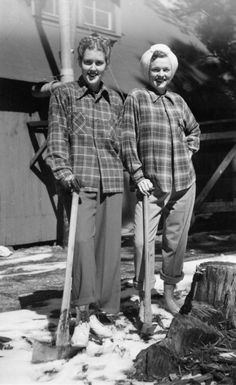
After beating my head against the wall that is Nita for weeks, I took a break and answered Questionables and had a wonderful time. Now I can go back to Nita refreshed, or at least not screaming.
Why did you work on this week?
The post Working Wednesday, March 27, 2019 appeared first on Argh Ink.

March 26, 2019
Argh Author: Brenda Margriet’s Allegro Court
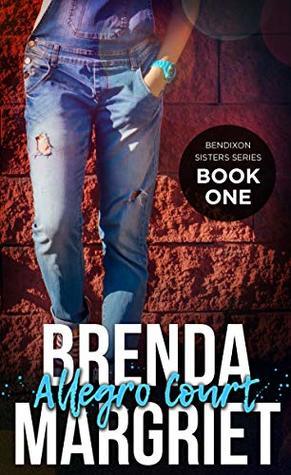
Brenda Margriet’s new book, Allegro Court is out now, the first in her Bendixon Sisters series, and for a VERY limited time (like the next five minutes), it’s available for 99 cents. You all know Brenda from here on Argh, but here’s some more about her:
Brenda Margriet writes contemporary romances with heroes you’d meet at the grocery store. And by that she means real-life men – sexy, smart and looking for the love of their life. Her heroines are bold, savvy and determined to accept nothing less than the man they deserve. A voracious reader since she was old enough to hold a book, Brenda’s idea of the perfect holiday involves a comfortable chair near the water (ocean, lake or pool will do), a glass of wine, and a fully-loaded e-reader.
And then there’s Allegro Court:
Marcus Temple escaped his despised birthplace, driven by his passion for music. Now a sophisticated, world-class cellist, he must return when his mother suffers a severe stroke. Going back also means dealing with the woman whose heart he broke when he left—Mattie Bendixon. More comfortable in overalls than orchestra seats, Mattie’s childhood dreams were simple—working for her grandfather’s construction company and building a life with Marcus. His ambitions forced her to abandon one goal, and now her beloved company is also under threat. Mattie thinks she sees a way to save Bendixon and Sons—if she can convince Marcus to stay in his hated hometown for one month. All she has to risk is her heart.
You can find Allegro Court on Amazon at https://www.amazon.com/dp/B07N5LRD1C ; more links are available on Brenda’s website: http://www.brendamargriet.com/.
The post Argh Author: Brenda Margriet’s Allegro Court appeared first on Argh Ink.

Questionable: Description, Yes, No, Lots, Little?

Kate asked:
What types of description do you think are needed in novels, and what do readers just skip over? Do readers like to know she has brown eyes and a dimple?
My take on needed description is “not much,” mostly because readers like to imagine their own characters and will overrule your descriptions if they get in the way.
Another reason is that I’m a bear about PoV and the only way a PoV character can describe herself is by looking in a mirror (NEVER DO THAT) which is completely unnatural. (Think about the last time you looked in a mirror; did you describe yourself? No. The last time I looked in a mirror, I thought, Who is that old woman and why is she wearing my pajamas?).
Another reason is that if we’re interacting with somebody in real life, we get impressions, we don’t stop to do inventories because that takes time, and the long pause and the staring will cause comment. So if a first person or third limited PoV character goes on for a paragraph about what somebody looks like, unless she has a good reason–she’s a detective analyzing a suspect, for example–she’s going to notice only a few telling details (telling to her and the story) and move on.
So what description can you use?
The big determiner is that “telling detail” bit, as in “What descriptive details are absolutely crucial to telling this story?” Readers need time and place to anchor the story, but they don’t need granular details of the setting, just enough that the characters aren’t walking through white space like Coraline. They also need to know enough about what the characters look like to personalize them, which is usually not hair and eye color unless the hair is blue. And you have to remember that whatever the PoV character notices is because of who they are, not who the other person is; we notice the details that are important to us, we don’t take general inventories.
For example, when I was writing Maybe This Time, I didn’t spend much time on Andie or North because what they looked like didn’t matter. What mattered were the details they noticed seeing each other for the first time after ten years, how they’d changed and how they hadn’t, how that hit them. I don’t remember what Andie looked like except that she had her hair pulled back and North didn’t like it; I remember that North looked tired and that made Andie catch a little. I couldn’t tell you Andie’s hair or eye color now to save me. But the little girl Alice had to be ghostly pale because I wanted the subtext that she was slowly turning into a ghost herself, that the supernatural was taking her, and that Andie’s fight would be taking her back. So Alice had pale skin, and pale blue eyes, and white-blonde hair to underscore that.
Nita’s description is pure plot: it needs to be there so Nick can look at her and see that she’s familiar, and then later see her father and realize why she’s familiar; that realization is a huge turning point, so I needed to mention several descriptive aspects that she shared with her dad. Nick’s description when Nita looks at him is only important because it’s fake; that is, he looks the way he thinks he used to look, but it’s been a long time and he’s forgotten, so he remembers himself as taller with ears that don’t stick out, and he’s left out his widow’s peak. As he’s poisoned and becomes alive again, he gets shorter, his ears stick out, and the widow’s peak comes back. It doesn’t matter that Nick has a widow’s peak; it matters that when it comes back, it’s a clue that he’s alive again. In the same way, it doesn’t matter that Mort has blue eyes and Nita has black until they tell Button they’re twins; now it’s a plot point that sets up a question for the future, the answer to which is crucial for the plot.
In those cases, the description is integral to the plot so the reader will use it in her understanding of the story; she’ll know subconsciously that it’s important. Anything else, the reader will probably forget (it’s not important) or discard (it’s annoying). In Manhunting, I gave Jake a mustache (god knows why) and I got several letters saying, “In my book, Jake has no mustache.” That works for me, and it was easy for readers, too, because after I gave him the mustache in the beginning, I never mentioned it again. It wasn’t important to the story. That’s dumb description.
It’s the same in setting, too: if you’ve decided to describe a rainy street at night, you can figure that the reader will know that the street is slick and neon reflects off the puddles; everybody knows that. But they won’t know that the street is cobblestone unless you tell them. And there’s no need to tell them unless the cobblestones come into play in some way, like they slow people down or somebody trips because cobblestone is hard to walk on. A few vivid, telling details that the PoV character notices for a reason are much more effective than long paragraphs of description going into every facet of the scene or person. That’s the part people skim.
Put another way, the fact that I have brown eyes has never meant a damn bit of difference to my life. The fact that Paul Newman had blue eyes made a big difference to his life. If you’re writing my story, you can skip the eyes. If you’re writing Newman’s, you’re gonna have to mention those telling blues.
Jane commented:
I get annoyed when two-thirds of the way through, the heroine’s blonde hair or green eyes are mentioned, contradicting whatever I’d sketched in. I’d far rather such things were made clear at the start.
This is important for exactly the reason Jane gives; it throws the reader out of the story. If you’ve got a specific description that’s going to come up later in the story, foreshadow it, preferably in the first ten pages or so (readers start building their character ideas right off the bat as they build the movie in their heads). For Nita, I got the black helmet hair and pointy eyebrows in with Button, enough to give the reader a general idea although Button’s comment still seems awkward, but I had to wait until the third scene to get Nita’s description of Nick, and that’s too far in, about thirty pages. The best I could do was give Mort a line in the car about the Devil in the bar being talk, dark, and scary.
Addendum: I was thinking about this post and remembered a story a friend of mine, a romance writer, told me about how she met her husband. You’d think it’d be romantic, and I’m sure the actual date was, but the story she tells is that he’d ask a friend to fix him up, and the friend said he had two possibilities, a blonde and a brunette. The future significant other said, “The blonde” (of course) and went on the date, which did not work out. Then he said, “Okay, the brunette,” and they’ve been together for decades. What does that tell you about my friend, aside from the fact that she has dark hair and a great sense of humor? Nothing. What does it tell you about her future husband back then? He was a guy. (What is it with blondes, anyway?). What does it tell you about hair color? Aside from cultural biases, it doesn’t matter.
And now that I think of it, another good friend of mine who’s a romance writer was dating a great guy, went home to meet his family and met his identical twin, and married the twin. They also have been together for decades (I think she can tell them apart now), so whatever detail it was that made her say, “Him, not him,” it wasn’t description.
The post Questionable: Description, Yes, No, Lots, Little? appeared first on Argh Ink.

March 25, 2019
Questionable: Writing Prompts

Cate wrote:
I recently joined a writing group for practice and (digital) community. We do a prompt a day (or however often you want) and use it as a jumping off point for flash fiction/ a short story.Are there any prompts you recommend? And, in general, is there anything you recommend for trying to get the most out of writing exercises?
My favorite teaching prompt came from Ron Carlson. He gave my MFA class this assignment: “Write a 26-sentence short story. The first sentence begins with A, the second sentence begins with B, the third sentence begins with C, all the way to the last sentence that begins with Z.” I thought it was the dumbest thing I’d ever heard, but I did it, and it turned out to be the start of probably the best short story I ever wrote, but also the back story of Crazy for You. The genius of it is that it takes structure away from you, and makes you think about non-story things (like what the hell you’re going to do with those Q, X, and Z sentences) and you find yourself writing a completely natural story because your fussy control-freak mind is distracted by the other stuff. Every single person in my MFA class did amazing short stories with that exercise. None of them were ready for publication, obviously you had to go back in and make them fully developed stories, but for getting the central idea of a story down, that exercise is golden.
If you’re in a writing group where you can trade work, one of my writing profs, Michelle Herman, gave us an exercise that was great. We’d all read the stories we’d been working on in class, so she had us bring them in and trade with each other and then write a short story using one of our characters and a character from the other writer’s story. That’s another one I thought was dumb until I tried it with a supporting character from one of my stories, and the way that opened up that character for me was amazing. Just the juxtaposition of a new character that wasn’t part of my story world was so jarring, I had to look at my character in a new light.
I think any time you do an exercise that pulls one of your characters into a different world or gives him or her a different problem, you’re opening up your story. Even asking something as simple as “What would this character order at an ice cream shop” can make you look at him or her in a new light.
And I would always try to use a character from the book or story I was working on then, even if it was a minor character. Maybe especially if it’s a minor character, since you usually don’t have time to explore them in the book.
Here’s my ABC exercise, before I revised it into a short story, and then wrote about Quinn, all grown up in Crazy For You:
The Day My Sister Shot the Mailman and Got Away With It, Of Course
After my sister, Zoë, shot the mailman, Mama grounded her for twenty-four hours and made her miss the big dance over at the Grange Hall in Xenia, but Zoë said it was worth it just to hear old Buster scream, and she didn’t care anyway because her boyfriend, Nick, is away at boot camp so there’s not much fun in Zoë’s life except for taking out the occasional public servant with a BB gun.
Buster Turnbull was a truly terrible mail carrier, Mama told Zoë when she grounded her, but shooting him was just un-neighborly and not the kind of activity she wanted her daughters to be associated with. Certainly Buster needed to be taken in hand and reminded that neither snow nor rain was supposed to keep him from handing over the stuff people sent us, and his unfortunate habit of reading postcards out loud as he went on his rounds had annoyed all of us, and not one of us was amused when he got tired of postcards and started flat-out opening our mail and shouting it to the world, but Zoë was amused the least because he liked reading her stuff the best.
“Dear Zoë,” he’d read at the top of his lungs when my sister would get a letter from Nick. “Every night I sit here and think about all the things we did to each other naked on your back porch and I get hot all over again.”
“Finegoings on,” Buster would call out before he’d read on, sounding like some hell-fire Baptist preacher looking to stir up trouble and stop pleasure. “Goodgirls wouldn’t get letters like this, and Miss Zoë McKenzie shouldn’t be either and I am just shocked that she is even though she goes around looking so sweet and pretty and all.” He didn’t get around women much since he looked like a peeled egg and had a personality to match, so he had no clue what kind of letters good girls got or didn’t get, but that didn’t stop Buster from making Zoë’s life particular hell.
Icould remember when Buster had been sort of fun, announcing what we were getting as he came up our steps, like previews of coming attractions at the movies. “Just in time for your birthday, Quinn,” he’d holler to me. “Kindly old Aunt Betsy has sent you a letter and I bet there’s a check in it.” Later on, he started holding the envelopes up to the sun so he could see how much the check was for, but of course that didn’t work because people always send checks in cards so it doesn’t look so cold and heartless sending money instead of a present, and I’m sure that must have been frustrating for him, trying to see into people’s lives and getting shut out by Hallmark. Maybe that’s why he started opening the mail; it just got too frustrating trying to see through the envelopes. Never getting any mail of his own, Buster probably just figured that he had the right to see ours since he was delivering it.
Opening other people’s mail is a federal crime, of course, but it probably didn’t seem like one to Buster. People never think what they’re doing is a crime because crime is always what other people are doing, but Zoë knew right off that Buster was breaking the law. “Quinn, we have to turn him in,” she told me after Buster had read the hot-sex-on-the-porch letter out loud while Mrs. Armbruster down the street stood on her steps with her mouth open, soaking up every word, ready to repeat it to Mrs. Mueller and Mrs. Papacjik and Mrs. Jerome, and we both knew that from there the news would percolate to Mama and there would go Zoë’s chances of ever finding heaven on the back porch with Nick again, assuming Mama would ever let her out of the house at all as long as she lived. Really, I’d have been seriously pissed off at Buster, too, so I was behind her all the way when she reported him. Somebody down at the post office promised to look into it, but my big sister knew a run-around when she heard one. The only thing left for her to do was to take matters into her own hands.
Unfortunately for Buster, he chose the next day to open a package from Nick which was full of old movies that Nick wanted Zoë to watch instead of going out with other guys and doing god knows what. “Videos for adult viewing,” Buster bellowed without reading the titles so he could make the worst possible call; “porn through the postal service.” Whereupon Zoë picked up the BB gun she’d loaded with salt pellets, went out on the front porch, and aimed just below the mail bag, said, “Buster, you have just violated your last piece of U.S. mail,” and opened fire, yelling, “Dance, gringo,” just like she’d seen in the Western Nick had sent her. Xenia heard Buster’s screams, they were that loud, but then you can imagine what that salt felt like going through Buster’s pants. You can’t imagine the sound he made, though; it was like a pig being pulled through a meat grinder backwards.
Zoësays she’s not sorry, and Mama grounded her because of it, but Buster’s not reading our mail anymore, so things are a lot better here.
The post Questionable: Writing Prompts appeared first on Argh Ink.

March 24, 2019
Happiness is Being a Cheap Beer Sign
My friends and family and therapist have all noticed that occasionally I sign off on them, staring into space with no apparent cognitive connection whatsoever. I have explained that it’s because I’m a writer and when people start talking in your head, it’s rude to ignore them, at which point my daughter says, “There are people talking in front of you, and it’s rude to ignore them, too.” My therapist says, “Okay, where did you go?” like I know where I went (out of the here into the nowhere, I just went). So I have to work on that, but I have come to realize that my ability to just drop out of reality has not only been a career move, it makes me happy. Reality is all well and good, but fantasy lifts the spirit.
And then I saw this Agnes cartoon:
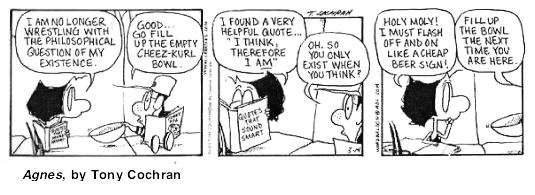
Somebody else will have to get the Cheetos, Agnes and I are not thinking at the moment.
How did you grasp happiness in the moment (there or not there) this week?
The post Happiness is Being a Cheap Beer Sign appeared first on Argh Ink.

March 23, 2019
Cherry Saturday, March 23, 2019

Today is Introvert’s Day, which means it’s my day. You’d think as social as we all are on here, we’d all be extroverts, but we’re being social in front of screens alone in our homes, so nope. Or maybe I’m projecting. I’m an introvert’s introvert; I moved to the middle of nowhere and go for days without talking to anybody but the dogs. And you guys. Then while looking for an image for this post, I came across a page of introvert T-shirts. I want them all:
My Time Alone Is For Your Safety
I’d Love To Stay and Chat, But I’m Lying
I Am A Social Vegan. I Avoid Meet.
I’m Just Here for the WiFi.
And then there’s the t-shirt I liked so much I actually bought it:
You Know What I Like About People? Their dogs.
And I’m pretty sure I’m going to buy this one because it may sum up the Argh people:

The post Cherry Saturday, March 23, 2019 appeared first on Argh Ink.






